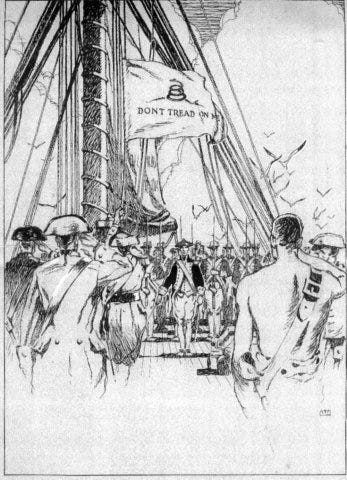On this day in 1775, a Philadelphia tavern owner is commissioned as commanding officer of the newly formed Marines. Samuel Nicholas received his commission only 18 days after the Continental Congress passed a resolution requiring that “two Battalions of Marines be raised” to support the recently organized Continental Navy.
The day of that original resolution -- November 10 -- is celebrated as the birthday of the United States Marine Corps.
Nicholas was another “Fighting Quaker”! He was the son of a blacksmith, but he’d worked his way up in society a bit. By the time the war started, he was a tavern owner and founder of the Gloucester Fox Hunting Club. He also belonged to an exclusive club called the Schuylkill Fishing Company. Because of his background, he had friends and connections in many classes of Philadelphia society. It was thought that he’d be the perfect person to recruit the tough guys who would be needed as Marines.
He could definitely recruit. He raised five companies of men in a relatively short period of time. In fact, it proved harder to get supplies than men. Nevertheless, he and his Marines were soon deployed on their first mission in the Bahamas. The operation was successful, and Nicholas hoped to be sent on more missions with his men.
He didn’t get his wish. Instead, he got a promotion that basically ensured that he’d be stuck performing administrative tasks.
Nicholas spent the summer and fall of 1776 recruiting more Marines. In December, he got his wish for more action, at least for a little bit. He and three Marine companies joined George Washington, then retreating from the British army. (Americans had just been driven from New York.) Washington, it seems, wasn’t quite sure what to do with the Marines. He asked whether “they came out resolved to act upon Land or meant to confine their Services to the Water only.”
In the end, the Marines were asked to row Continental soldiers across the Delaware River before the Battle of Trenton. They did not engage in that attack, but they were involved in the actual fighting at the Battle of Princeton one week later. The Marines with Nicholas were involved in a few more skirmishes during the following months, but Nicholas later returned to Philadelphia to resume his administrative duties. He was trusted and respected, but he was also apparently frustrated by his role. According to one early 20th century historian, Nicholas wrote of his “mortification” to discover that because of his promotion, he had become a “useless officer, at least in sense of danger.”
He wanted to be more involved in the actual fighting.
Nicholas served for almost the entire Revolution before returning to civilian life. He passed away in August 1790 during a yellow fever epidemic. He may have been frustrated with the lack of “danger” in his work, but he at least lived long enough to see America finally gain the freedom for which he had worked so diligently.
Sources can always be found on my website, here.



This is quite timely and significant in my family because my son, my step-dad, and my father-in-law were all Marines. It's quite refreshing to learn more about the birth of the Corps and its significance then and now. Thank you, Tara, for your scholarship and your willingness to share your expansive knowledge of our nation's history with us.
My schoolmate who will be promoting to Brigadier General next year once said it's hard to go from being a leatherneck to a politician. God bless them all! Thanks to you, Tara Ross 🇺🇸🇺🇸🇺🇸